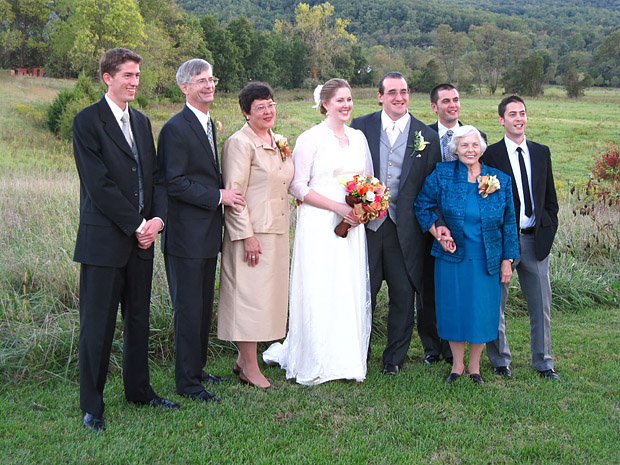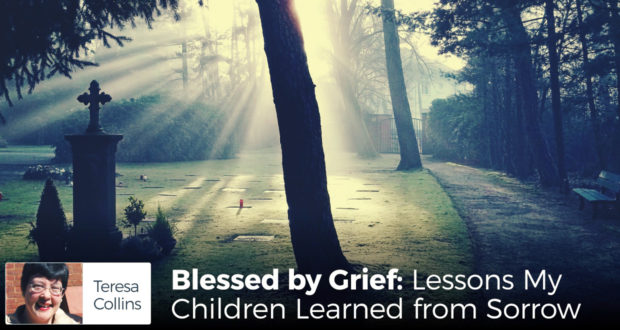Our family was blessed with five children, a daughter followed by four sons. We lost our second son and middle child when he died suddenly and unexpectedly from a viral disease at the age of fifteen.
The verse on his headstone gives an idea of the child he was: “Behold an Israelite indeed, in whom there is no guile” (John I:47).
Returned to God
Almost immediately after our son’s death, it was as natural to us to ask him to pray for us as it was for us to pray for his soul. Indeed, since his death, I have prayed to him more than for him, and this has never seemed to be presumptuous because he was “pure of heart.” Doubtless he has been a loving and constant advocate with God for his family and all those for whom he prays.
Our son was essentially straightforward and guileless, and I believe that God gave us the grace to be like him in our grieving. We mourned simply and without anger.
St. Francis de Sales, writing to a father who had lost his son, said, “For you will have well known how to consider that this dear child was more God’s than yours, who had it only as a loan from that sovereign liberality. And if His Providence judged that it was time to withdraw it to Himself, we must believe that it was for the child’s good….This son has, I think, gained much by leaving it [the time in which we live] almost before properly entering it” (St. Francis de Sales, Thy Will be Done: Letters to Persons in the World, Manchester, New Hampshire, Sophia Institute Press, 1995).
By God’s grace we were able to grieve within the context of the knowledge that this child was God’s and had returned to Him.
Solacing Each Other
The death of our son and brother taught us as a family how to console. In the months after our loss, when I would break down during our home-school day, our oldest son would frequently stop his school work to embrace and comfort me.
When my husband spoke at his father’s wake, his voice quavered at the end of his speech. Another son, sitting between his mother and sister at the wake, and sensing that his father’s grief would affect us, reached out immediately to both of us to comfort us. There were many such instances in the months and years after our son’s death, many times in which we helped “bear one another’s burdens.”
“Blessed are they that mourn, for they shall be comforted” (Matthew 5:5). Although this verse can refer to those who mourn for their sins, it can also refer to the comfort of the Holy Spirit given to us in times of sadness and desolation, whether this comfort is given directly from God or through other people.
Our family experienced both, as we prayed for comfort and strength, and as we solaced each other. I know that I became aware in a very concrete way, and in a way I had never been aware before, of the Mystical Body of Christ and the Communion of Saints. St. Paul, speaking of the Mystical Body, says in his first letter to the Corinthians, “If one member suffers, all suffer together…” (I Corinthians 12:25-26).
Awareness of the Sufferings of Others
The Catechism of the Catholic Church states, “In full consciousness of this communion of the whole Mystical Body of Jesus Christ, the Church, in its pilgrim members, from the very earliest days of the Christian religion, has honored with great respect the memory of the dead; and ‘because it is a holy and wholesome thought to pray for the dead that they may be loosed from their sins,’ she offers her suffrages for them (Catechism of the Catholic Church 958).
The many prayers offered for our son and for our family manifested to us the mutual charity of God and His Mystical Body.
The Gospels mention that Christ had compassion on the suffering, and that He was “moved with pity.” Compassion is an internal movement of the heart, “stirred by pity for the bodily and spiritual sorrows of others” (Blessed John Ruysbrouk, The Adornment of the Spiritual Marriage, XVII, quoted in A Year with the Saints: Daily Meditations with the Holy Ones of God, Paul Thigpen).
Those who are concerned with the commandment to love our neighbor will notice “the grief caused by loss of family, friends, goods, honor, peace; and all the countless sorrows that human beings necessarily suffer” (Blessed John of Rusybrouk, The Adornment of the Spiritual Marriage, XVII, quoted in A Year with the Saints: Daily Meditations with the Holy Ones of God, Paul Thigpen).
An awareness of the sufferings of others makes us remember that helping each other in our sufferings is one aspect of love our neighbor. In the years since our loss, we have become more mindful of the suffering and sorrow around us, and consequently have been conscious of a certain brotherhood or fellowship with those who suffer, and of the need to help them if we can, and to pray for them.
Life is a Continuum
Another blessing that has come to us as a result of the death of our child is the strong awareness and realization that life here on earth and in heaven is a continuum. “Life is changed, not taken away,” as it says in the preface for the Mass for the Dead, and all those who have died in Christ, live, and will never die.
The love between those who have lived in this world together will also never die. Love reaches across eternity.
My husband and I are happy in the realization that our remaining children are very close, that they live near each other, see each other regularly, help one another, and love one another. This would most likely have been the case even if they had not lost a sibling and shared a common grief. But the loss of their brother drew them closer together, and the result is a very strong bond among them.
The word “vulnerable” comes from the Latin “vulnerare,” meaning “to wound,” and thus “vulnerable” means “capable of being wounded.” We are more vulnerable because we lost our child, or perhaps we recognize more clearly our vulnerability. This realization can be difficult, but it can also be a blessing.
If recognizing and accepting our own vulnerability and weakness encourages us to turn to God and acknowledge our very real dependence on Him, then our very frailty is a source of strength. St. Paul, in his Epistle to the Corinthians states, “My grace is sufficient for you, for my power is made perfect in weakness” (II Corinthians 12:9).
Though our faith is not perfect, and our human fears still strong, and we cannot yet say unconditionally with St. Paul that, “Gladly, therefore, will I glory in my infirmity, that the power of Christ may dwell in me,”( II Corinthians 12:9), I believe that we are now more conscious of our need for and reliance on God.
A Result of Grief
A stronger desire for heaven is a blessing that comes as a result of loss and grief. We have a desire for eternal life primarily for the sake of God Himself, and seeing Him face to face is the greatest joy of heaven. But we also have a desire for reunion with those whom we have loved and lost in this world, and this reunion will be another source of joy in eternity. This realization can and does impel us toward our goal.
The blessings of grief do not alter the fact of grieving. With our family, and probably with all those who have lost someone they love, there remains the old wound that has healed, but that still aches.
But it seems fitting that our attitude should finally be one of gratitude and even gladness, gratitude for the gift of a child, and gladness that his life has fulfilled its purpose. In the words of St. Hedwig, “I thank you for having given me this son who always loved me. Dear it was to me to see him alive; still more consoling is it to know that he is forever in your kingdom.”
And as his grandfather wrote after we buried our son, we can indeed think of our son’s life with thankfulness, and of his death with “resignation, acceptance, even joy, joy that a saint has lived among us.”

The Collins Family at Christine Smitha’s (née Collins) Wedding

 Seton Magazine Catholic Homeschool Articles, Advice & Resources
Seton Magazine Catholic Homeschool Articles, Advice & Resources

